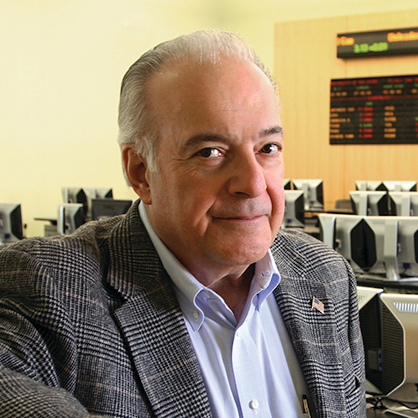
University News
Passing of Devoted University Benefactor Sam Bergami Jr. ’85 EMBA, ’02 Hon.
President Jens Frederiksen, Ph.D. shared the sad news that one of the University’s most devoted benefactors passed away late last week.
University News
Universities.com rated the University of New Haven in its 2021 ranking of the top colleges in the United States to pursue a degree in forensic science, lauding the unique and innovative hands-on learning opportunities and faculty with industry experience who continue to make an important impact in the field.
November 3, 2021
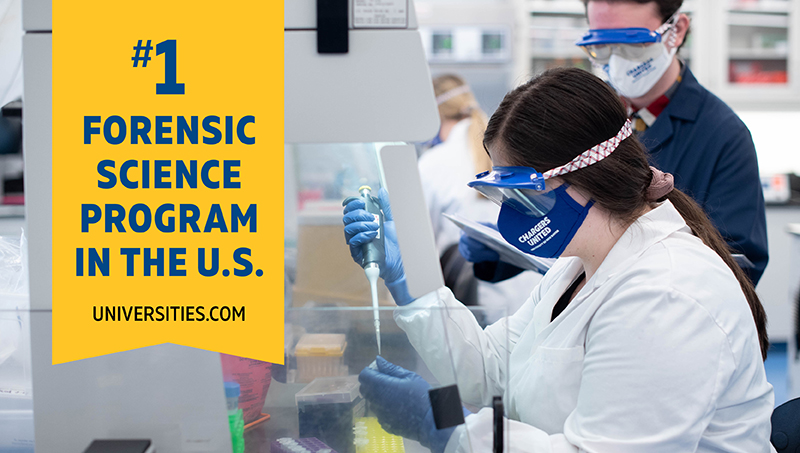
For Morgan Korzik ’22 M.S., it was the stories he’d heard about his great grandfather, a Chicago detective in the vice squad, that inspired his interest in forensic science. He also wanted to dedicate his career to public service and to helping others.
Recalling a particularly memorable and inspirational story, Korzik says that, while off duty, his great grandfather was partially blinded while trying to stop a bank robbery. He was hospitalized for weeks afterward, but despite his ordeal, Korzik says his great grandfather couldn’t wait to get back to work so he could continue to help others.
Now a candidate in the University’s graduate program in forensic science, Korzik says he is grateful for the opportunities he has had to gain the technical and professional skills he will need to excel in his own career.
“I wanted to pursue an M.S. Forensic Science degree at an accredited university, and I saw that the University of New Haven was one of the most highly rated universities for forensic science,” he explains. “After I had been accepted, the admissions counselors and faculty who reached out to me made me feel truly welcome as a member of the Charger community, and I was excited to attend.”
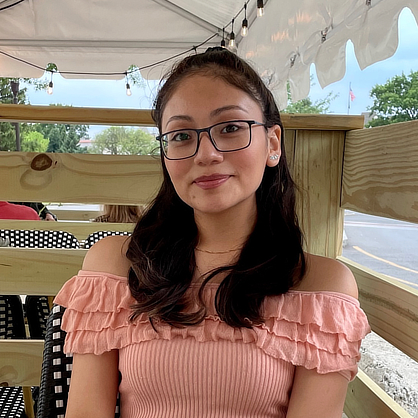
The University has been recognized by Universities.com as the best school in the country to study forensic science. It offers undergraduate and graduate degrees in forensic science, as well as a master’s degree in forensic technology. Endorsed by the Forensic Science Education Programs Accreditation Commission (FEPAC), the University enables students to study in the state-of-the-art Henry C. Lee Institute of Forensic Science, which honors the legacy of world-renowned forensic scientist Henry C. Lee, Ph.D., who launched the University’s forensic science program four decades ago.
The University’s accreditation was especially important to Ingrid Abanto Chaffo ’22, who hopes to become a lead forensic toxicologist at a state or federal laboratory. Now working as a lab assistant in the University’s Forensic Science Department, she enjoys the interdisciplinary nature of the work.
“The best part of the program is the hands-on experience and well-versed faculty available to each student,” she said. “Throughout my college experience, my professors have offered such great knowledge and experience that have shaped my approach to forensic casework and fieldwork. Getting a firsthand point of view of real cases, scenarios, and challenges in the field has aided in my understanding of this career path.”
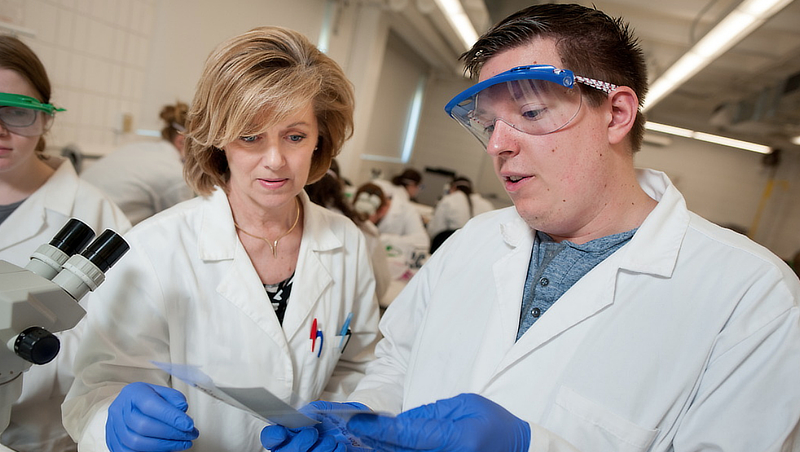
Students learn from faculty who are leaders in the field and who have significant experience, such as Virginia Maxwell, D.Phil., who spent 15 years as part of the State of Connecticut Forensic Laboratory in the Trace Evidence Section. Now at the forefront of investigating animal cruelty investigations, Dr. Maxwell developed an online graduate certificate program in the topic that is one of the only such programs in the country.
“All of our courses are taught by current or former practitioners in their field,” said Dr. Maxwell, assistant dean of the University’s Henry C. Lee College of Criminal Justice and Forensic Sciences and program coordinator of the University’s M.S. in forensic science. “Graduates of the program can be found in almost every forensic laboratory in the U.S. and beyond. We consistently review and enhance our program, adding new courses and electives in relevant and topical areas of forensic science.”
The animal cruelty investigation certificate is among the many certificates the University offers, including digital forensic investigation, trafficking in persons investigations, and forensic genetic genealogy, one of the fastest growing areas of forensic science. Faculty teach students the latest technologies and methodologies in forensic science, and they continue to make an important impact in real-world cases, as Angie Ambers, Ph.D., recently did. Her work helped exonerate a man who was wrongly convicted of murder.
"It is so rewarding to see [students] get that dream job, get into that dream graduate school, or be selected to present at a regional or national professional conference for the research they've done." Lisa Dadio, M.S., MSW
Faculty are making an important impact in a variety of areas within forensic science, including wildlife forensics and the investigation of human trafficking – a topic that Timothy Palmbach, J.D., is especially passionate about. Chair of the University’s Forensic Science Department, he serves as director for the University’s Center for Forensic Investigation of Trafficking in Persons.
“Ours was one of the very first forensic science programs in the U.S.,” said Dr. Palmbach, who spent more than 20 years with the Connecticut Department of Public Safety. “We have been committed to staying at the forefront of developing and teaching our students cutting-edge methods. Some of this work has led to Centers of Excellence committed to addressing issues of human trafficking, animal cruelty, and wildlife forensics."
Students have unique opportunities to learn to use the latest technology while gaining hands-on experience. They study in the Henry C. Lee Institute for Forensic Science, a resource for law enforcement agencies around the world that includes cutting-edge crime-scene labs, and they take part in mock investigations in the University’s crime scene house.
The University’s innovative graduate program in forensic technology focuses on combining that technology with the forensic science field, training crime scene investigators to use technology such as laser scanners, biometric devices, and ground penetrating radar to help solve crimes.
"The forensic technology program is unique in that it prepares students to be successful in the field-based disciplines of forensic science, such as crime scene and death investigation, while incorporating practice with new technologies including drones and portable instrumentation,” said Maria Torre, M.S., coordinator for the M.S. in forensic technology program who has served as a crime scene technician for the Waterbury, Conn. Police Department’s Forensic Unit.
“When students interview for a position as a crime scene investigator, their educational and practical experiences within our program set them apart from other applicants,” continued Prof. Torre. “Our faculty – all current and former practitioners – create those experiences and ensure our students are qualified for these types of careers."
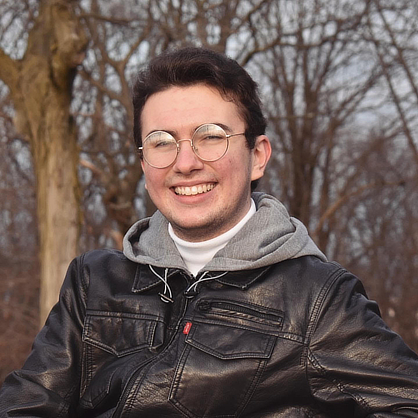
Undergraduate and graduate students have myriad opportunities to conduct faculty-mentored research and to take part in interactive internships throughout the United States – and beyond. Students have immersed themselves in hands-on learning and research opportunities from the University’s campus all the way to Curaçao.
"I am incredibly proud to be part of a program that always puts students first,” said Lisa Dadio, M.S., MSW, director of the University’s Center for Advanced Policing and a retired New Haven Police Department lieutenant. “I always tell my students that their success is my success, their failure is my failure. From the first day a student begins one of our programs, we take on a mentoring role with them. It is so rewarding to see them get that dream job, get into that dream graduate school, or be selected to present at a regional or national professional conference for the research they've done under the guidance of our faculty."
Korzik, the forensic science graduate student, says he is grateful for the support of faculty who are dedicated to his and his classmates’ success. He describes the professors he has had as “kind, knowledgeable, and helpful.
“All of the professors I have met genuinely want to get to know me and see me succeed,” said Korzik, who aspires to work as a forensic scientist with a focus on either forensic biology, DNA, or latent evidence. “The program has given me the opportunity to take courses in all of those disciplines, giving me knowledge behind the theory and hands-on experience with the instrumentation involved. Additionally, I have been able to take courses in other forensic science disciplines, helping me gain a better understanding of how my specific interests fit into the bigger picture.”
Interested in learning more about our forensic science programs? Click here.

University News
President Jens Frederiksen, Ph.D. shared the sad news that one of the University’s most devoted benefactors passed away late last week.

University News
The University of New Haven took a leadership role in bringing together a group including 16 academic institutions and six community organizations and nonprofit agencies that will collaborate with the goal of establishing Connecticut as a premier hub for artificial intelligence, innovation, and application.

The Charger Blog
Music and Sound Recording major Mattingly Creter ’27 sat down with Professor Goodfellow to talk about his recent tour, latest album, and the evolution of his music.